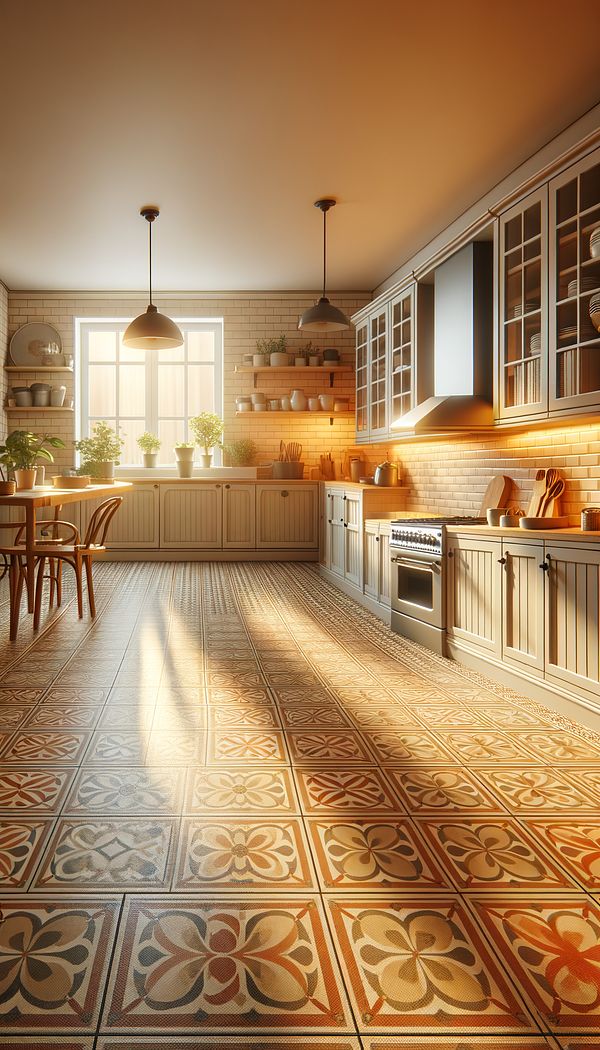What is Linoleum?
Linoleum is a durable, eco-friendly floor covering made from natural materials.
Description
Linoleum is a resilient flooring option known for its durability, comfort underfoot, and environmental friendliness. It is made from natural materials, including linseed oil (which is derived from flax), pine rosin, wood flour, cork dust, and limestone, combined with jute as the backing. These components are mixed and calendared onto a jute backing to create the flooring material. Unlike vinyl, which it is often confused with, linoleum is biodegradable and made from renewable resources, making it a popular choice for those seeking sustainable interior design solutions.
The versatility of linoleum extends beyond its environmental benefits. It is available in a wide array of colors and patterns, which are integrated throughout the thickness of the material. This means that the design does not easily wear away, maintaining its appearance over time. Linoleum is also known for its natural antibacterial properties and is easy to clean, making it suitable for both residential and commercial settings.
Installing linoleum can be a bit more complex than other flooring options, as it requires a perfectly smooth subfloor and may need to be glued down. Despite this, its long-term durability and the warmth it adds to spaces make it a favored option among homeowners and design professionals alike.
Usage
Linoleum is widely used in both residential and commercial spaces. In homes, it can be found in kitchens, bathrooms, and living areas due to its durability and ease of maintenance. In commercial settings, such as hospitals, schools, and shops, its durability and antibacterial properties are particularly valued.
FAQs
-
How does linoleum differ from vinyl flooring?
Linoleum is made from natural, renewable materials and is biodegradable, while vinyl flooring is made from synthetic materials. Linoleum's patterns and colors run through the entire thickness, whereas vinyl has a printed top layer.
-
Is linoleum suitable for high-moisture areas?
Yes, linoleum can be used in high-moisture areas like bathrooms and kitchens, but it must be properly sealed to prevent water damage.
-
How long does linoleum flooring last?
With proper care and maintenance, linoleum flooring can last up to 40 years or more.
-
Can linoleum flooring be installed over existing floors?
Linoleum can be installed over existing floors, provided the surface is smooth, clean, and free of any moisture issues.
-
Is linoleum flooring eco-friendly?
Yes, linoleum flooring is considered eco-friendly due to its natural, renewable materials and biodegradable nature.
-
Does linoleum require special maintenance?
Linoleum requires regular sweeping and mopping. For best results, use cleaning products specifically designed for linoleum flooring.
Practical Application
When considering linoleum for your next flooring project, take into account the style and color of your space, as there is a wide variety of options available. Prioritize obtaining high-quality material and ensure that the installation is done by a professional to avoid any potential issues. Regular maintenance will keep your linoleum flooring looking new for years to come.
-
Materials & Textiles360 articles
-
Flooring & Carpets48 articles
-
Sustainability & Eco-Friendly Design69 articles
-
AdaptableAdaptable in interior design refers to spaces, furniture, and fixtures that can easily be modified to accommodate changing needs or preferences.
-
Finger PlatesFinger plates are protective plates mounted on doors to prevent wear and tear from frequent handling.
-
Greek StyleGreek Style refers to the design and decoration principles originating from ancient Greece.
-
MoiréMoiré is a unique visual phenomenon produced by the superimposition of two or more sets of fine patterns or grids.
-
PercalePercale refers to a closely woven, plain-weave fabric known for its crisp, smooth texture.
